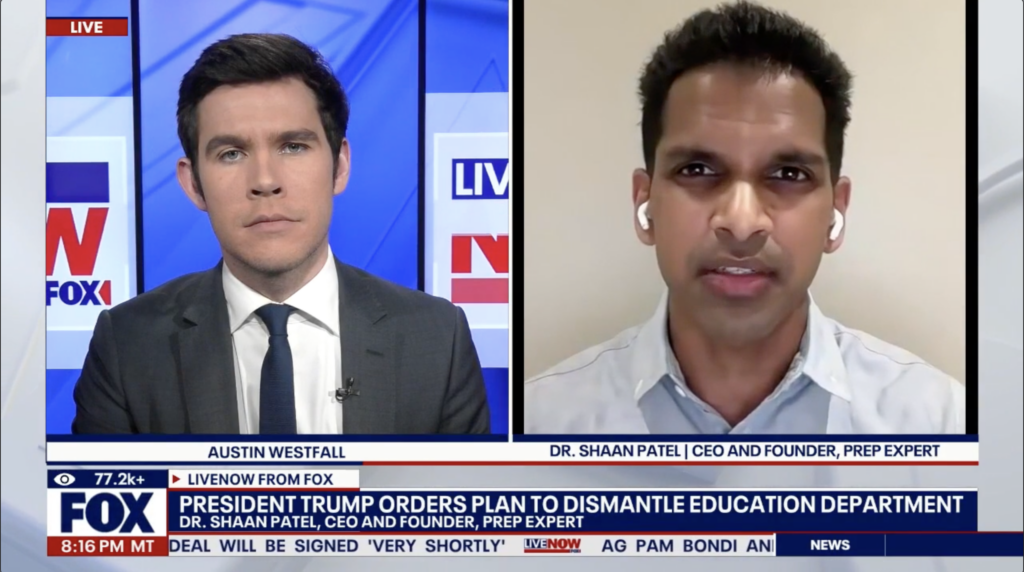Fox News Interview With Dr. Shaan Patel

It’s Time to Rethink the Department of Education
By Dr. Shaan Patel, CEO & Founder of Prep Expert
Last week, President Trump signed an executive order to begin dismantling the U.S. Department of Education. As someone who has spent the last 15 years in education—helping students prepare for college and succeed on standardized tests—I think this is the bold move our system has needed for a long time.
Let me explain why.
We’ve Spent Trillions… for What?
Over the past few decades, the U.S. has poured more than $3 trillion into the Department of Education. Its current budget sits around $70 to $80 billion a year. Yet despite this massive investment, American students are falling further and further behind.
Reading and math scores are at all-time lows. According to federal data, 70% of eighth graders are not proficient in reading and 72% are not proficient in math. And ACT scores recently dropped to their lowest point in over 30 years. I’ve seen that decline firsthand in my own students.
We’ve thrown money at the problem—but the results aren’t improving. That’s not a funding issue. That’s a systemic failure.
Federal Oversight Has Stifled Innovation
The Department of Education was created with good intentions: to support students, enforce civil rights protections, and offer federal aid. But over time, it’s become bloated and overly centralized. It mandates top-down curriculum standards for a country that’s too diverse—geographically, politically, and educationally—for a one-size-fits-all approach.
Federal mandates have crowded out creative, locally driven solutions. Schools often don’t have room in their schedules to teach financial literacy, entrepreneurship, or AI skills—because they’re busy “teaching to the test” or checking boxes on compliance reports.
Education Decisions Belong Closer to Home
I’m a federalist when it comes to education. I believe the best decisions happen at the state, district, and school level—made by the people who know their students and communities best.
Let’s be clear: this executive order doesn’t eliminate essential student programs like FAFSA or federal student loans. Those are protected by Congress and will continue—possibly under different departments. But what it does do is create the opportunity to reallocate resources away from bureaucracy and toward impact.
What Happens Next?
The process won’t be immediate. Executive orders signal intent—they don’t execute change overnight. Congress will still need to weigh in, and agencies will need time to shift responsibilities. But we should be using this transition period to reimagine education from the ground up.
This is a chance for public-private collaboration. Local school districts should partner with the private sector and nonprofits to develop modern curriculum models, invest in technology, and offer students the tools they’ll actually need to succeed in the real world.
Final Thoughts
Look—I understand that change at this scale can be uncomfortable. But what’s far more uncomfortable is watching generation after generation of students fall through the cracks of a system that no longer serves them.
We’ve tried spending more. We’ve tried national mandates. It’s time to try trusting local educators, empowering families, and creating flexible, future-ready schools.
This isn’t about politics. It’s about priorities. And if the Department of Education can’t deliver results for our kids, then maybe it’s time we gave someone else the chance.
—
Dr. Shaan Patel is a Shark Tank winner, bestselling author, and the founder of Prep Expert, a leading college admissions and test prep company. He scored a perfect SAT and has helped over 100,000 students raise their test scores.
Written by Dr. Shaan Patel MD MBA
Prep Expert Founder & CEO
Shark Tank Winner, Perfect SAT Scorer, Dermatologist, & #1 Bestselling AuthorMore from Dr. Shaan Patel MD MBA

What to Look For in Colleges: A Guide to Successful Searching
When you’re making college decisions, you have a lot to keep in mind. Your college experience isn’t just the four…
Fox News Interview With Dr. Shaan Patel
It’s Time to Rethink the Department of Education By Dr. Shaan Patel, CEO & Founder of Prep Expert Last week,…

Historical ACT Percentiles from 2016 to Today: Data-Driven Insights for Your College Application
A high ACT score isn’t just a personal achievement. It’s a valuable tool for your college application because it communicates…